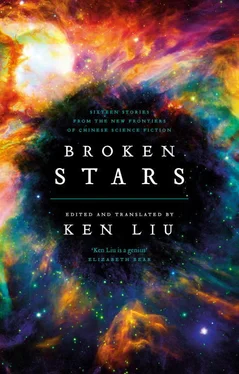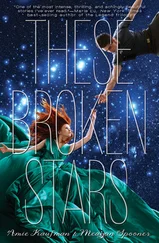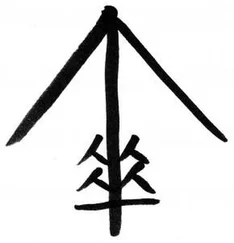The gaps and seams persisted in the places that could not be encompassed by words.
Religion, music, painting, love, pain, joy, loneliness—these words are like the tips of icebergs, concealing the unfathomable, vast, complicated feelings beneath the surface. They accompanied humanity’s cultural genes from ancient times, and like the sedimentary strata of geology, folded and overlapped one another, interpenetrating and merging, evolving until today.
When you discuss these topics, you know not what you’re discussing.
All societies wish to promulgate an effective set of linguistic regulations in order to rectify the thoughts of the masses. From Qin Shihuang’s edict for all China to write the same way, to the Newspeak of 1984 , words have vanished and new idioms have been invented. Some expressions were usable only by certain classes in certain places, while the masses were required to avoid these formulations reserved to the noble and highborn, and so they invented slang that required the overactive associative brain to smoothly wield its store of homonyms, puns, metonyms and rhymes, a celebration of the tongue and the vocal cords.
In a certain age, even revelry was a disciplined ideological tool, realized through technology.
The government installed firewalls in the language center of the brain of every newborn, thus achieving for the first time in history a real-time language surveillance network. When what an individual wished to say triggered the filters in their firewall—which were constantly kept up to date—the firewall cut off the person’s speech and punished them with an appropriate level of pain. On the other hand, when the person spoke the words that satisfied the desires of those in power, the firewall rewarded them with a pleasure similar to drugs.
A brave new world of reward and punishment.
The system worked so well that people, of their own initiative, devised a way to integrate the filters into their genes so that they could be passed on to their children, allowing them to meld with the firewall even more seamlessly. Eventually, even the merest hint of an undesirable thought would be eliminated before it could take root, maximally reducing the potential for being punished. The mechanism gradually became a part of the unconscious, assimilated into the part of the cortex that we inherited from our amphibious, piscine, reptilian ancestors, meshed with the most primitive part of human language.
Then things took a different turn.
Humanity never fully understood what happened next, not even now in the time I’m from. One theory is that humanity was indeed the creation of some higher intelligence, who implanted into the human mind a highly designed language system. The system evolved as civilization developed, but when a foreign invader threatened its fundamental principles, it would reset the system to factory defaults and return everything to the origin. The system was also highly infectious.
Can you imagine it? A world without language. Everything collapsed.
The problem wasn’t that it was impossible to talk; rather, humanity lost the very tool necessary to understand the world and the self. The universe returned to primeval chaos.
I am the product of a second system. Very few individuals showed symptoms of it—maybe in your time, it would be called “divine inspiration.”
It was no longer I who spoke words, but words that spoke me.
It was as if the divine intelligence had lost patience with foolish humans. The chosen ones who brought with them a brand-new linguistic logic had to direct the unenlightened primitives to reunderstand the world and rebuild civilization. The new world did seem to be more peaceful, more enlightened, more perfect. Scientists invented time machines and discovered the theory of timelines. They dispatched envoys to parallel universes along different timelines to spread the gospel so that the humans in these other worlds could avoid their mistakes. Many of these envoys did not meet happy fates.
This is why I, Stanley, have come from the future to speak to you. For reasons that I cannot reveal, I will terminate my sojourn here shortly and leave your timeline to leap into another unknown world.
In your universe, the number nine is special, symbolizing permanence, rebirth, the supreme. I hope the nine chapters of my gospel can accompany the lost souls of this world through the door at the end of time, to achieve eternal recurrence.
A BRIEF INTRODUCTION TO CHINESE SCIENCE FICTION AND FANDOM [24] Originally written in English.
by Regina Kanyu Wang
Chinese science fiction has remained largely mysterious to the outside world until recently. In 2015, Liu Cixin (刘慈欣) won the first Hugo Award for Asia with his novel The Three-Body Problem («三体»), and in August 2016, Hao Jingfang (郝景芳) won the second with her novelette “Folding Beijing” («北京折叠»)—both translated by Ken Liu, who is himself a Hugo-winning American author. Now, as more and more Chinese science fiction is translated into English and other languages, it is the perfect time to explore its history.
This essay mainly focuses on science fiction, not fantasy, but a few words on fantasy may be helpful. In China, the boundary between science fiction, or kehuan (科幻), and fantasy, or qihuan (奇幻), is seen as quite rigid. However, due to our historical tradition in myths and kung fu stories, it is hard to define Chinese fantasy as a whole. You will find it hard to tell qihuan (奇幻: fantasy) from xuanhuan (玄幻: mostly referring to online fiction with Chinese-style supernatural elements) and mohuan (魔幻: mostly referring to fiction with Western-style magic elements). Narrowly speaking, though, current Chinese fantasy literature excludes themes such as grave robbery (盗墓, daomu : stories involving a group of treasure-seekers breaking into ancient graves, where they come across ghosts and all sorts of other evil creatures), time travel (穿越, chuanyue : stories featuring a contemporary person traveling back in time to ancient dynasties for some unexplained [and unimportant] reason, where they become involved in complicated courtly intrigue or some other soap-opera-like plot), and Daoism immortality-chasing (修真, xiuzhen : stories featuring a protagonist overcoming various challenges to pursue immortality by Daoism method), which stand as popular genres by themselves.
There have been fantasy magazines and fan groups throughout contemporary China, but compared to science fiction, Chinese fantasy literature is not at its peak. Having said that, TV series and movies adapted from successful early works are starting to come out in recent times. For example, in 2016 we have Novoland: The Castle in the Sky (2016), a TV series based on the Novoland fantasy universe, which is meant to be China’s Dungeons & Dragons and is the collaborative effort of many fans and writers; and Ice Fantasy (2016), a TV series adapted from the bestselling City of Fantasy (2003), written by Guo Jingming, a famous Chinese YA author. However, for this essay, I will only talk about science fiction in mainland China.
1.
PREHISTORY AND EARLY HISTORY OF CHINESE SF
Like all cultures, Chinese legends and myths have fantasy elements in abundance. In China, however, the first text in the science fiction genre can be found as early as 450 BC to 375 BC. In one of the classics of Daoism, Liezi («列子»), we can find a story called “Yanshi” («偃师») in the chapter “The Questions of Tang” («汤问»). Yanshi, a skilled mechanic, builds a delicate automaton resembling a real human being, which can move, sing, and dance. He shows the dummy to the king to prove his skill. The dummy is so delicate and convincing that the king suspects Yanshi is cheating him by using a real human. At the end, Yanshi has to break the automaton to prove that it is only made of wood and leather. Yanshi’s automaton can be seen as a prototype for an early robot.
Читать дальше












